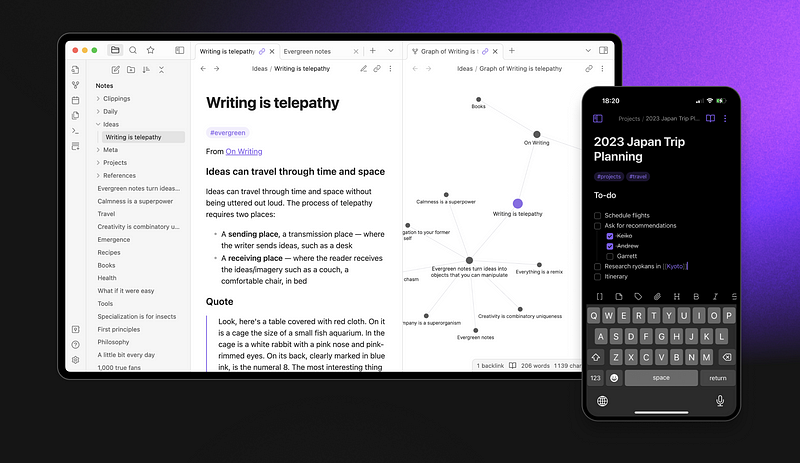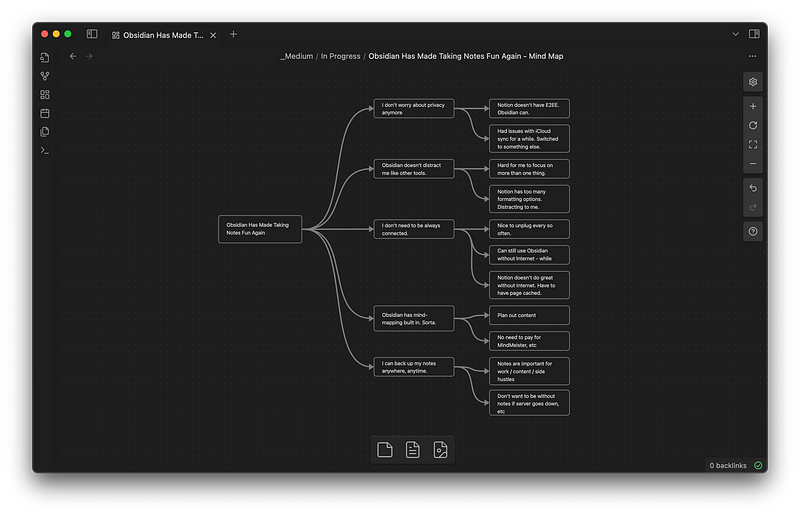Obsidian: The Note-Taking Tool That Revitalized My Workflow
Written on
Chapter 1: A Game Changer in Note-Taking
Switching to Obsidian has been one of the most impactful decisions I've made regarding my note-taking practices. Over the years, I've dabbled with numerous tools—Notion, Craft, Simplenote, Evernote, Google Keep, and Apple Notes—but none have held my interest long-term. However, my experience with Obsidian has been transformative.
Initially, I encountered some challenges, but those have since been resolved. I'm now so satisfied with Obsidian that I can't imagine reverting to any other platform. The switch from Notion has revolutionized my productivity, making the process of taking notes not only less stressful but also enjoyable.
I no longer have privacy concerns
While Notion is an incredibly versatile note-taking tool, my growing apprehension about the privacy of my stored information led me to reconsider its use. Notion lacks end-to-end encryption and does not allow me to control the storage location of my notes, leaving me unsure if unauthorized parties could access my data. Although the risk was minimal, it still existed.
In contrast, Obsidian prioritizes my privacy and security in a way Notion does not. Initially, I opted to store my notes in iCloud with end-to-end encryption enabled, which facilitated synchronization across my devices. However, as I began to face synchronization issues—primarily due to iCloud rather than Obsidian—I realized I needed to change my approach.
Although I briefly considered returning to Notion for its seamless functionality, I ultimately decided that my privacy was paramount, even at the cost of some convenience. I eventually transitioned to Obsidian Sync. Initially hesitant due to the associated costs and the fact that I do not own the servers, the end-to-end encryption offered significant peace of mind. Now, only I possess the encryption password, ensuring my notes are secure.

Obsidian minimizes distractions
My tendency to get easily distracted can hinder my productivity. Whenever I opened Notion, I found myself sidetracked by its myriad formatting tools and options. I often spent more time experimenting with layouts than actually taking notes.
While options are beneficial, too many can be overwhelming. Many tools present interfaces that resemble an airplane cockpit, and I prefer a more streamlined experience. Obsidian provides an extensible yet straightforward interface, allowing me to hide the default sidebar and enter full-screen mode to concentrate without distractions.
Though I sometimes wish for more formatting features, I appreciate that Obsidian minimizes the temptation to fiddle with settings at the expense of productivity. I've learned to simplify my workflow, focusing on one or two important tasks at a time to maintain my momentum.
I can work offline without interruptions
There are times when I prefer to disconnect from the internet, and that's where Obsidian excels. As an offline-first tool, it enables me to create and edit notes without requiring a web connection. This functionality allows me to unplug from digital distractions, helping me resist the urge to open another browser tab or play games.
Notably, I was able to take detailed notes at a recent conference without relying on public Wi-Fi or my phone's hotspot. While Notion does offer limited offline capabilities, it falls short in allowing me to access notes I haven't visited recently without reconnecting to the internet. Obsidian's ability to function offline is a significant advantage.
Obsidian supports mind mapping, in its own way
One of Obsidian's standout features is its "Canvas" tool, which allows me to visually organize information. During a recent conference, I used the canvas to map out various breakout sessions and link to my notes.
While it may not be as user-friendly as dedicated mind-mapping tools like MindMeister or Xmind, Obsidian's capability to integrate writing and mind mapping in one platform is a significant convenience. Previously, I had paid for MindMeister, but now that I can accomplish similar tasks within Obsidian, I see no reason to maintain that subscription.

Backing up my notes is easy and flexible
My notes contain crucial information for work and personal projects, so I need reliable backup options. I don't want to face the risk of losing access to my notes due to server outages or company closures. Obsidian simplifies the backup process; I can easily copy my local vault to any storage solution—be it Dropbox, Google Drive, or a USB drive.
This straightforward backup method bolsters my confidence in using Obsidian, ultimately enhancing my productivity. Trust in the tools I use is vital to my workflow, and Obsidian has earned that trust.
You should love the tools you use
Over time, I've become increasingly convinced of the necessity of enjoying the tools I use in my workflow. They should enhance my productivity rather than hinder it. While what works for one person may not be suitable for another, Obsidian has significantly benefited my process.
It has alleviated my concerns about security, minimized distractions, enabled offline work, allowed for mind mapping alongside writing, and provided easy backup options. For a free tool, it is remarkably impressive.
As someone who can be overly particular about productivity tools, I’ve often found myself lost in the minutiae instead of focusing on my tasks. However, Obsidian has helped me organize my thoughts and plan my ideas efficiently. Other tools may have functioned adequately, but they often felt like obstacles. Obsidian, on the other hand, supports my goals and helps me stay on track.
Now, if only I could remember where I put my phone…
Chapter 2: Enhanced Note-Taking Techniques
The first video titled "Taking notes for RPGs in Obsidian with Andy Polaine" delves into innovative note-taking methods tailored for role-playing games, showcasing how Obsidian can enhance creativity and organization in gaming contexts.
The second video, "Taking notes for work with Obsidian," explores practical strategies for leveraging Obsidian to boost productivity in professional settings, demonstrating its flexibility and efficiency as a note-taking tool.